|
Route we travelled:
Day1 (25th) : Sana'a-Dhamar-Radaa-Al Bayda.
Day2 (26th) : Al-Bayda - Habban - Ataq
Day3 (27th) : Ataq - Bir Ali
As any day, the 25th of December promised to be very sunny. Clear blue skies with a blasting sun quickly heating the chilly midnight air. A strange feeling, Christmas day 2000
without any sign of Christmas. That morning we prepared ourselves for a 9 day trip through the south of Yemen. Our driver, Ahmed Alhasel, had arrived last night coming from his village near Al-Bayda and was still
asleep when we came down with our backpacks.
After breakfast we met Ahmed and his car, a handsome man in his early 40-ties wearing traditional Yemeni dress and Yambiya. He was standing in front of his white
'82 Toyota Landcruiser imported from Saudi Arabia. He must have given his car a quick polish looking at the dusty cloth in his hand. After a firm handshake he helped us putting our backpacks in his car. The inside
was like any other Yemeni car, colourful and tell-tail signs of heavy use everywhere we looked. The dashboard was covered with a colourful cloth, chairs draped with a thick rug and a few religious ornaments dangling
from his rear-view mirror. The outside of his car was plastered with many stickers from European tour organisation, indicating he free-lanced a lot.
We left the Hotel silently around 9am with Ahmed looking
sleepy and a bit worn out. Our first conversation with Ahmed was about Ramadan. Life during this month is hard, Ahmed sighed. Specially in combination with work. Life is reversed, day becomes night and night becomes
day. It's not unusual to stay up all night with family and sleep during the day. Since a few years Ahmed decided not to work during Ramadan, since it puts too much strain on him and his family. The trip with us was
an exception on his rule he told us. He just had spend a 3 week holiday with his family. But with the end of Ramadan within reach he decided to sign on for this trip, returning a favour to Abdul Karim the
owner of the Hotel.
Driving through a very quiet Sana'a we passed the presidential palace, the huge military parade street and of course a military complex so huge one could fit a small town in there. The
embassy area near the presidential palace literally breathed money, so completely different from old Sana'a. Expensive Landcruisers parked in the streets, the (only) BMW dealer in Yemen presenting new models in a
shiny white showroom and of course heavily guarded embassy buildings surrounded by huge thick walls.
Outside the urban area we encountered the first military checkpoint. A sand filled oil barrel in the
middle of the road where a small crew of military passed their time with stopping anyone who tried to pass.
Ahmed had a huge stack of travel permit copies laying on the dashboard, and gave one to the first guy
sticking his head inside his car. A few words were exchanged between Ahmed and the military followed by a few smiles towards us. We could go, because it was already passed 9 am and we had the required travel
permits.
Later we learned that Sana'a closes down for foreigners between sunset and 9am. Locals can pass but again driving at night in Yemen is an extremely hazardous undertaking, specially during Ramadan.
Traffic is dense after sunset and with many tired people behind the wheel serious accidents are simply a logical and sad result of the latter. On our route we saw numerous fresh wrecks from last night. Cars crushed
beyond recognition with windows and doors painted red with the blood of the unlucky passengers.
While passing through the lava like landscape outside Sana'a we were overtaken by many taxi's fully packed with
people. With the end of Ramadan approaching the demand for transportation rises dramatically. Many Yemeni people celebrate the end of Ramadan with their family, and leave the big cities to go back to their home
towns.
We drove through small towns in a sun battered landscape. During photo stops children quickly surrounded us from all directions trying out a few English words on us. Their weary faces showed the
effects of a hard life on a relatively high altitude. Winter here comes with relatively cold nights (5-10 degrees Celsius) and little rain. But nonetheless the children we saw looked cheerful and happy.
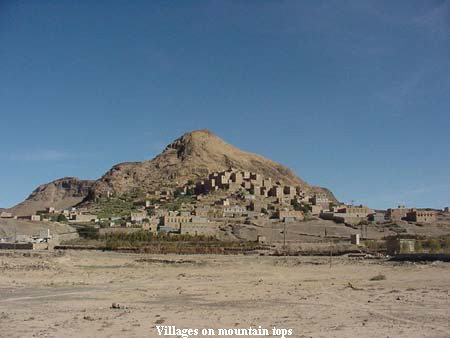 |
We passed many qat fields surrounded by guards in stone houses protecting the fields.
Although theft is nearly non-existent, scoring a small bush of qat on a stroll through the countryside can be very tempting. Specially because the stuff is quite expensive (500-700
Rials) and chewed almost daily to help fight the cold and the effects of Ramadan.
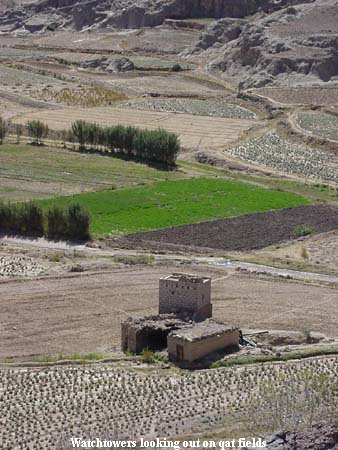 |
At the 3rd checkpoint near Dhamar a guard stepped into the car. Ahmed explained that this
might be the case on many days of our trip. Normally the guard will step out again at the next checkpoint, asking Ahmed (not us) for a small fee or so called 'baksheesh'. The latter wasn't
the case a few years ago Ahmed assured us.
In a short time many military guards started asking money when the word got out that some
tourists gave away considerable amounts of money. They certainly don't get a lot of money from the government so a ride with a bunch of generous tourists can be quite lucrative.
Thoughts of the Yemeni army getting commercially involved in the tourist business flashed through our heads :-)
During the ride to the next checkpoint our guard fell asleep. Are we such a bore to travel with
? Just before Radaa we stopped for lunch at another checkpoint. Ahmed parked his car a bit away from the checkpoint, so we could eat something without offending others. It was hot and
dry in the sun. And this is only wintertime!
We continued our journey after a short break now accompanied by three men in a police car.
Our escort made sure we were spotted by everyone we passed by either flashing their lights or babbling into their police horn.
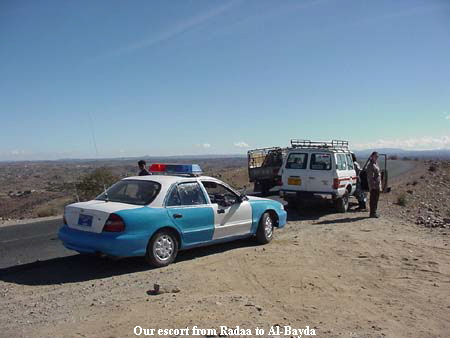 |
In Radaa we stopped our parade for a short visit of the souq. Before we knew it we were
accompanied by one of the military guys. He even took us on a personal tour to a point where we could oversee a part of Radaa.
It was worth the effort though, we wouldn't have found that spot without him. At some point our guard dumped his Kalasnikof in Arno's hands and said 'Sura! Sura!', meaning picture. And
so we did, we made a picture of a proud guard in camouflage clothes next to Arno uneasily holding his Kalasnikof.
The Radaa souq was small but original, however many shops were closed. A few shops
traded spices, vegetables, fruits and all kinds of electrical stuff. And last but not least a Kalasnikof shop full with a variety of firearms. How convenient we thought, coming home with
two kilo's of grapes, a bunch of tomato's and a few fresh rounds for your Kalasnikof. Just an average shopping day in town...
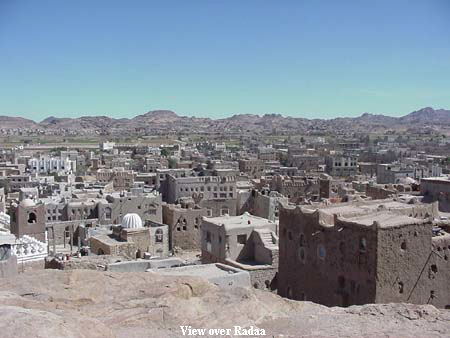 |
We left Radaa in a traffic chaos, a sheep market was just about to begin. Battered cars
everywhere, crowds of men all carrying fire-arms and of course truckloads of sheep. After Radaa we got into the same mess two times. The crowds got so thick we hardly could get
through. Our police escort at some point started blasting their 'FBI' horns. It didn't help much, the howling sound somehow attracted loads of kids. They plastered their faces on the
windows very curious about who's in that car needing a police escort. Somehow it didn't feel that comfortable, the amount of firepower outside our car was big enough to start a nasty war
. Even Ahmed got a bit restless, seeing the crowds clinging on to his car.
Somehow we got out again and later that afternoon we managed to reach Al Bayda. The
town looked like a big festival was about to begin. The streets were crowded, it was real hard to see where the road was taking us. After a while we spotted Yarmouk Hotel, and
Ahmed indicated that this was the place he was looking for. When we parked in front we saw that a big tourist group had arrived just before us. 5 Landcruisers so the Hotel might be fully
booked. But we got lucky, there was one very small double room left. After the obligatory inspection we accepted. The room looked reasonable clean including sheets and even a TV.
After saying goodbye to Ahmed, who was going to visit his family nearby we crashed in our rooms, beat from the impressions of the first day.
Later that the evening we decided to get something to eat, the noises outside indicated that many people were out there doing the same. Outside our senses got an instant shock
treatment, Arabic music everywhere, the streets flooded with happy people. Laughing, talking, haggling, selling, buying, so much activity going on, we didn't know where to look.
A bit uneasy by the mass of people we tried to walk around a bit. On the opposite side of the street we found a restaurant crowded to the top with the tourist group who also had invaded
the Hotel. With a real sad face the owner indicated that all the food was eaten already by the tour group. A good day for business we thought, unluckily for us we had to continue our food
hunt. After a while we found a busy market street where people were selling hot food on their mobile carts. With our hands full of French fries quickly wrapped in today's newspaper, two
breads stuffed with potato and a kilo of fresh banana's we returned to our room. A nice Christmas diner.
We ate our catch while watching TV, the first time since 5 months. MBC (Middle-East
Broadcasting Corporation) showed a lot of news from the region. We were amazed by the western style of their news coverage, such a difference with the Arabic world on the streets.
The main news was that Ramadan hadn't ended yet. The new moon hadn't showed itself so one more day of fasting to go. It must have been quite a disappointment we thought, the
crowds on the streets might have been there hoping to celebrate the end of Ramadan.
The next day we continued our journey towards Habban. Ahmed spend the night with his
family, and picked us up from the Hotel round 9 in the morning. "One more day" he said, Ramadan will be finished tomorrow. He left his kids in a sad mood because they were
hoping he was going to stay one more day. The celebration of the end of Ramadan is a big feast in Yemen and celebrated with the whole family. We felt sad for Ahmed too.
We left Al-Bayda without a guard or police escort, but as Ahmed indicated, there will be plenty in stock on the road ahead of us.
After a few checkpoints we reached the former border area of south Yemen. Ahmed told a few stories about how life was in the days before unity of south and north Yemen. Many
people died here and the war left a big scar in the lives of many families in Yemen. We could see a few remainders of the border area, mostly deserted army hide-outs in the rocky terrain.
Walking in this region is a hazardous undertaking, mines and leftovers from the war are littered all over then place.
A few kilometres further we reached Thira military checkpoint. This place has a magnificent view over the flat planes a 1000 meter below us. And we were lucky, incredibly lucky Ahmed
said. He never saw such clear sky at Thira before. We just stood there frozen by the stunning sight in front of us. We could see many eroded mountain peaks in the distance pointing up
from the flat landscape. Between the mountains a wild pattern of farming fields decorated the grounds, a sign of fertile land being displayed below us.

The road curled down real steep over a jagged mountain ridge towards the flat planes below. The Chinese government had helped South Yemen to build this road in the days this region
was still under communist influence. Before that time, Ahmed told us, the trip from the planes below to Thira nearly took a day on a dangerous rocky trail. We could imagine the battle,
Yemeni people bashing their vehicles on the steep road going up. Quite a dangerous undertaking for both human and vehicle.
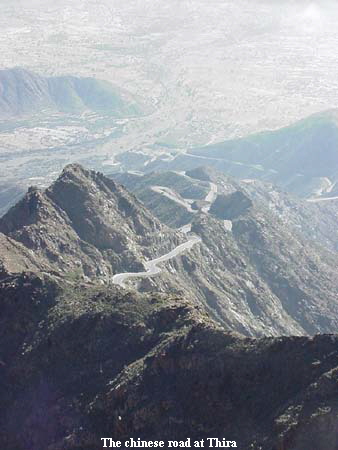 |
Some 1000 meters below we continued through hot and dusty farmlands. We passed a few
sesame-seed grinders powered by a few unlucky camels. Although these animals can still walk outside, in old Sana'a they have to do the same job in small shacks.
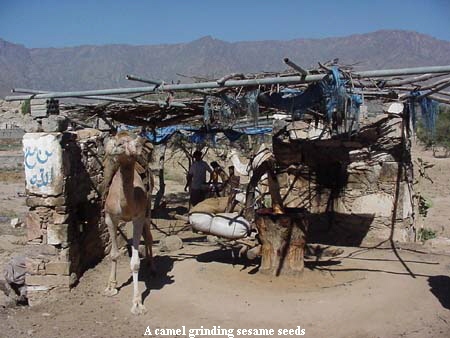 |
From Thira we encountered many military checkpoints. And we got guards in our car again,
some silent others very talkative. At each checkpoint a new guard stepped in, while the other asked Ahmed for the (now) obligatory fee. The story goes that the guards need the money to
get back to their checkpoint. In reality they simply wait for the next car with tourists to get a ride back. But well we don't blame them, we would probably do the same in their position.
From Thira to Habban the landscape had completely changed. Rough black mountains were replaced by dusty farmlands where many farmers tried to make a living. It was hot and the air
incredibly dry, leaving us with sweaty faces and sticky clothes. While looking at the surrounding vegetation, we saw many signs of a huge water reserve below the surface.
Green spots littered the landscape everywhere we looked. The mountain range disappearing behind us must bring a lot of water down during the rain season.
Just before Habban the country side changed again. We entered a region with light brown coloured mountains, some with a few remaining signs of a long lost volcanic history. All signs
of water below the surface quickly disappeared, everything looked sunbeaten dry. A harsh region for sure, just like a desert.
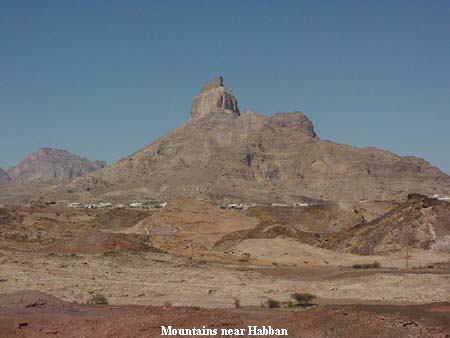 |
At the Habban checkpoint we were briefed that the one and only Hotel was closed because
of Ramadan. So we got permission for a detour to Ataq, a town closely located near the desert edge. When we approached the city we saw many new houses, most of them quite
modern and with only a few signs of a Yemeni architectural style. Ahmed said he didn't like this new building avalanche at all. The people who funded the new buildings made their
money in Saudi Arabia. They fled the country when the south of Yemen suffered under soviet influence. Now they've come back changing the landscape with new buildings and new ways of doing things.
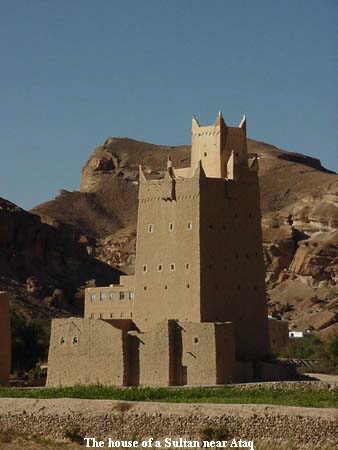 |
Near the centre, we settled down in the "22 mayo" Hotel, remembering the visitor of the war
of unity in 1994. A clean and fairly modern Hotel undoubtedly erected for oilworkers. Ataq has a flourishing "oil scene", and there might be more of the same in the future. We where
the only guests that day and could enjoy a real blasting hot shower.
In the evening we joined Ahmed for dinner in the restaurant next door. Ramadan was officially
finished now, so eating, drinking and smoking was back to normal again. During dinner we brought up the desert route between Sayun and Marib. We expressed our doubts about
taking the 'taxed' route with the Bedouin. We told Ahmed we knew about the new asphalt route and preferred taking that one. First a little unsure, Ahmed told us about the difficulty
about by-passing the Bedouin people by taking the Asphalt route by ourselves. Next to this Ahmed didn't know the route himself. He always took the desert route with a Bedouin escort.
After a short debate about the Bedouin tax Ahmed promised to make a few inquiries in Sayun about the possibility of taking the asphalt route. At that point we weren't sure at all if
we could take our planned asphalt route. We didn't feel like paying 200 US$ for a one-day Bedouin escort at all. But well we were prepared to 'bite the dust' as a calculated risk, but not at once...
The next day we had breakfast in the hotel lobby together with a group of Yemeni people. We watched a live coverage of the religious opening ceremony in Sana'a of the end of Ramadan
in Yemen. The images were intersected by live coverage of the same ceremony in Mecca. A few times we saw the king of Saudi Arabia looking over huge crowds of Moslems round the
black stone. The other people in the lobby where clearly impressed by the images on TV, and so were we.
To us the images expressed the power of the Islamic religion. So many people so intensely
involved in expressing their faith. After a month of fasting the whole Islamic world returns to their normal pattern of living. We left the Hotel deeply impressed with what we've just seen
and experienced in that Hotel lobby.
With two guards in the front seat we continued our trip to Bir Ali. At the Habban checkpoint
both guards jumped out but unfortunately we got another one in the back seat. "Clingon incorporated" we thought.
A few kilometres behind the checkpoint we crossed a wadi to visit the skyscraper town of old Habban. While we entered the marketplace of Habban we saw many children dressed in
very colourful clothes. It must have been the celebration of the end of Ramadan. In our dusty clothes we looked like a bunch of hobo's compared to those kids.
Old Habban amazed us, high mud brick buildings rising high above us. Small windows at random heights with different sizes wildly decorated with woodcut work. The buildings
radiated the passion of the people who build them. Not a single window looked the same with the outside incredibly geometrically even in shape.
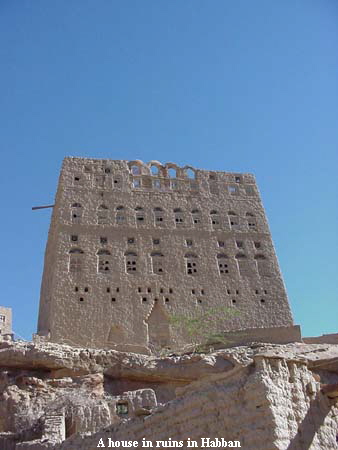 |
Outside old Habban, Ahmed showed us a few fields where people had been preparing
special mud needed for maintaining their buildings. To us the fields looked just like normal farming fields, although we saw nothing being grown there.
Round noon we reached Bir Ali, a black-red rock at the end of a intensely white beach.
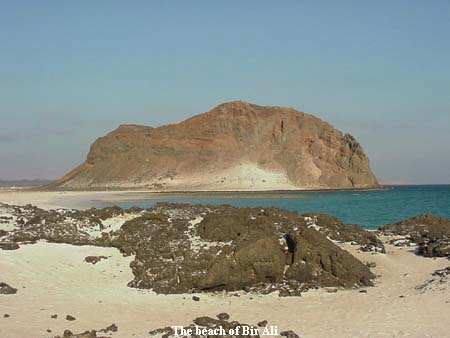 |
We would be spending the night on the beach so we had to get some water and food in the
village near Bir Ali. But first we ate fish in a small restaurant near the checkpoint of Bir Ali. Then for the first time in Yemen we saw people eating outside, Ramadan was finished for
sure. While we were eating our fish we watched a goat being butchered on the other side of the road by military guards. Probably their lunch in the making.
After we topped off our water canisters and having bought some food we drove through dusty dunes towards the beach. To our surprise even the rock of Bir Ali had a checkpoint. After a
few words we could continue. Ahmed explained they were there for our protection. Protection we thought ? Who's going to bother us here? But that became clear to us in the evening.
Having driven a few Km's on the beach we reached a sand pocket which was going to be our camp for the rest of the day and night.
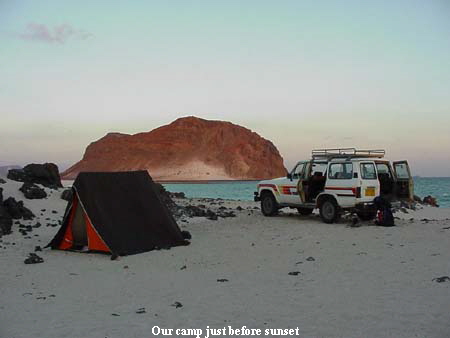 |
We set-up camp and spend the rest of the day walking on the beach, reading and writing
while Ahmed chewed qat in his car. His first bush of qat during the day for nearly a month so we left him in peace :-).
With the approaching sunset we gathered a stack of wood and made campfire before it got
dark. We made soup, ate Arabic bread with peanut butter and had tomato's with a bit of salt as dessert. Over a cup of tea we talked about life in Yemen and what the future might bring.
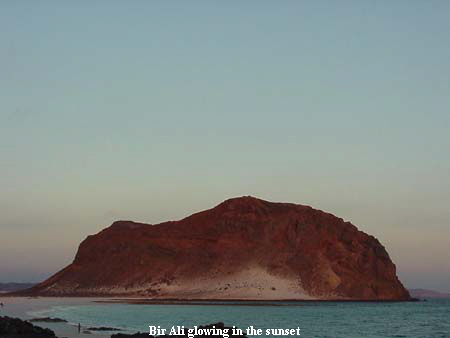 |
Later that evening we heard the popping sound of a fisher boat approaching the beach.
Ahmed jumped up and walked into the darkness, leaving us alone at the campfire. 15 minutes later he returned again with a fish and a big smile on his face. The fishermen were
smuggling people to Yemen Ahmed told us. He got a 'baksheesh' fish from the 'fishermen' hoping Ahmed wouldn't tell the guards what was going on here. 'Mush mush kila' (no problem
) he probably would have said. Anyway, we enjoyed the fish and talked some more afterwards before crashing on the beach for the night.
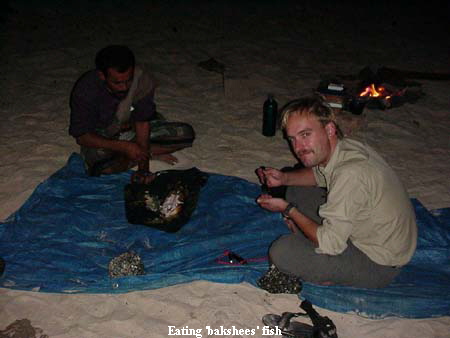 |
After three days we've travelled 674 Km and passed 23 checkpoints. Without the help of
Ahmed we would have needed a lot more time for the same route, given that we would bring our own transportation. With public transportation (taxi/bus) we wouldn't have made it this far,
we would be sent back to Sana'a without doubt.
Spending the night in the wild would most certainly have caused big problems with the local
police or military. Trying to hide wouldn't have helped us much, we would have been spotted in no time. In this region of Yemen, probably the best place to spend the night outside a Hotel
might be a military checkpoint.
|
|
